Contract and Postal Rules: Case Study on Offer and Acceptance
VerifiedAdded on 2022/08/10
|9
|2455
|45
Case Study
AI Summary
This case study delves into the core principles of contract law, specifically focusing on the elements of a valid contract: offer, acceptance, consideration, and intention to create legal relations, along with the application of the postal rule. The scenario involves Dr. James Cork offering to sell his van to Elizabeth Turner, and the subsequent communication and acceptance via postcard and letter. The analysis examines the application of the postal rule in the context of the case, referencing relevant case laws such as Boulton v. Jones, Carlill v. Carbolic Smokeball Company, Adams v. Lindsell, and others. The study explores whether a valid contract was formed, considering the specific offer, acceptance, and the timing and method of communication. It also contrasts the situation with other legal precedents, such as Blue v. Ashley, to determine the intention to create a legal relation. The conclusion affirms the existence of a valid contract based on the proper communication of offer and acceptance, and the consideration element will further validate the contract.
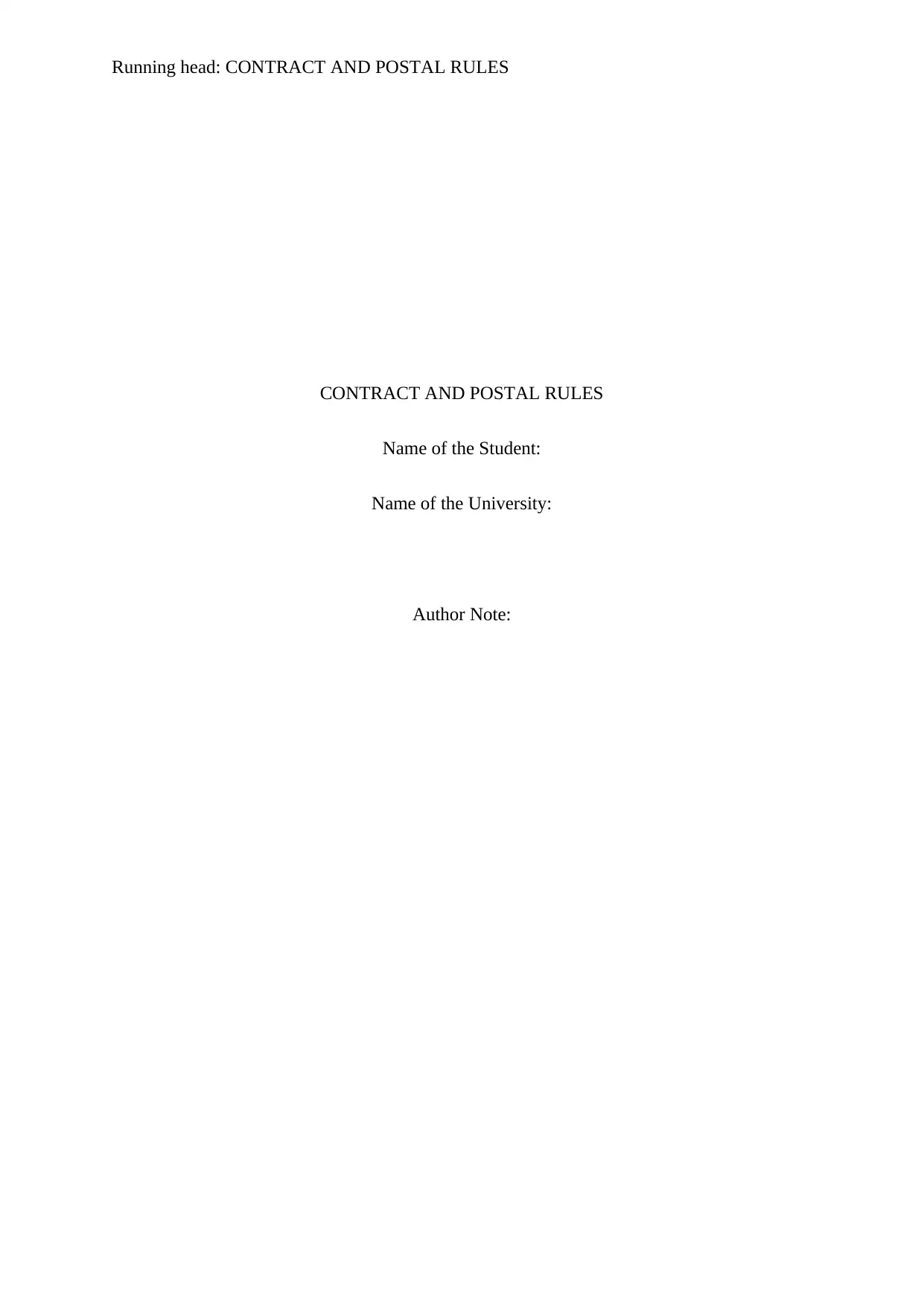
Running head: CONTRACT AND POSTAL RULES
CONTRACT AND POSTAL RULES
Name of the Student:
Name of the University:
Author Note:
CONTRACT AND POSTAL RULES
Name of the Student:
Name of the University:
Author Note:
Paraphrase This Document
Need a fresh take? Get an instant paraphrase of this document with our AI Paraphraser
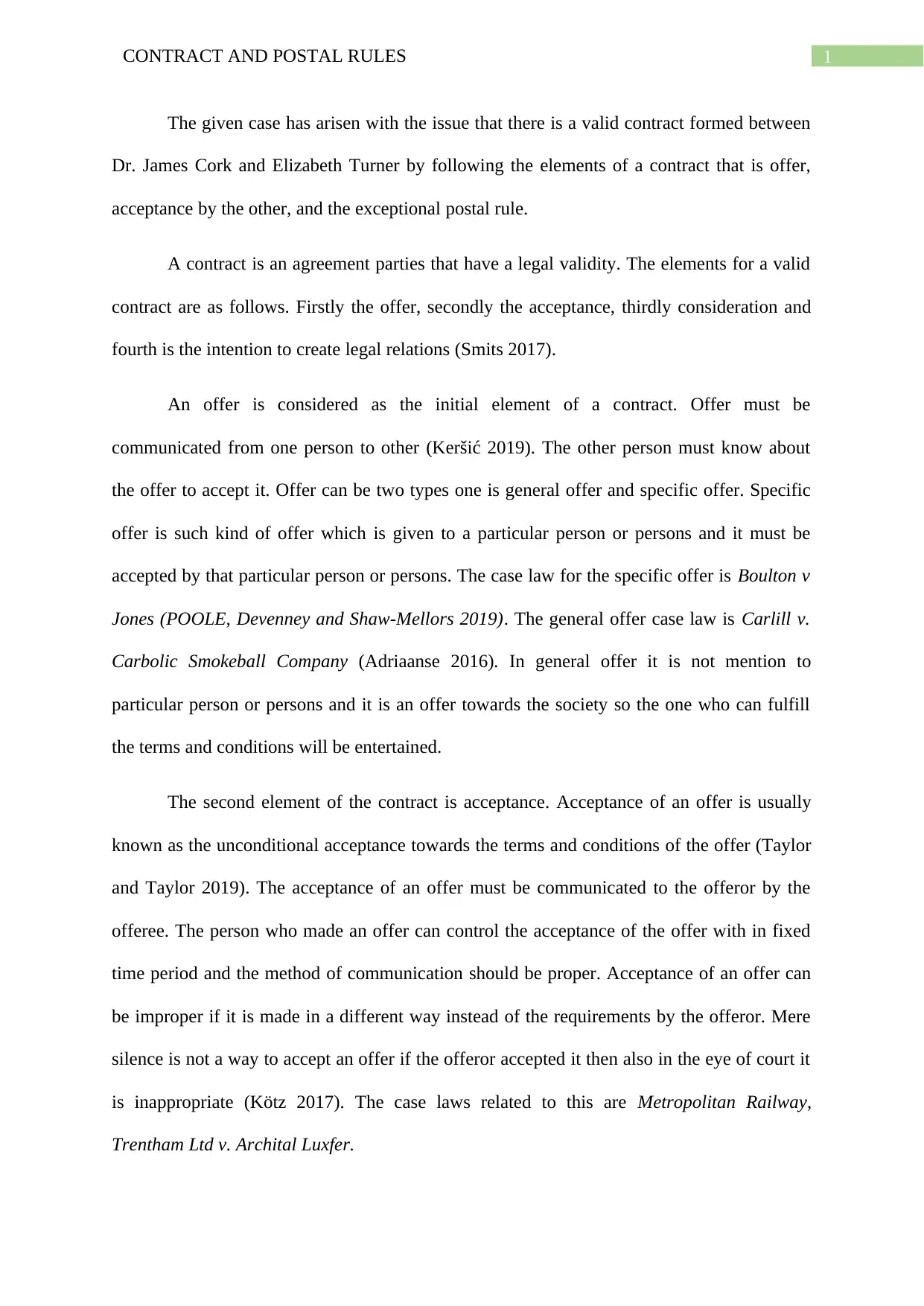
1CONTRACT AND POSTAL RULES
The given case has arisen with the issue that there is a valid contract formed between
Dr. James Cork and Elizabeth Turner by following the elements of a contract that is offer,
acceptance by the other, and the exceptional postal rule.
A contract is an agreement parties that have a legal validity. The elements for a valid
contract are as follows. Firstly the offer, secondly the acceptance, thirdly consideration and
fourth is the intention to create legal relations (Smits 2017).
An offer is considered as the initial element of a contract. Offer must be
communicated from one person to other (Keršić 2019). The other person must know about
the offer to accept it. Offer can be two types one is general offer and specific offer. Specific
offer is such kind of offer which is given to a particular person or persons and it must be
accepted by that particular person or persons. The case law for the specific offer is Boulton v
Jones (POOLE, Devenney and Shaw-Mellors 2019). The general offer case law is Carlill v.
Carbolic Smokeball Company (Adriaanse 2016). In general offer it is not mention to
particular person or persons and it is an offer towards the society so the one who can fulfill
the terms and conditions will be entertained.
The second element of the contract is acceptance. Acceptance of an offer is usually
known as the unconditional acceptance towards the terms and conditions of the offer (Taylor
and Taylor 2019). The acceptance of an offer must be communicated to the offeror by the
offeree. The person who made an offer can control the acceptance of the offer with in fixed
time period and the method of communication should be proper. Acceptance of an offer can
be improper if it is made in a different way instead of the requirements by the offeror. Mere
silence is not a way to accept an offer if the offeror accepted it then also in the eye of court it
is inappropriate (Kötz 2017). The case laws related to this are Metropolitan Railway,
Trentham Ltd v. Archital Luxfer.
The given case has arisen with the issue that there is a valid contract formed between
Dr. James Cork and Elizabeth Turner by following the elements of a contract that is offer,
acceptance by the other, and the exceptional postal rule.
A contract is an agreement parties that have a legal validity. The elements for a valid
contract are as follows. Firstly the offer, secondly the acceptance, thirdly consideration and
fourth is the intention to create legal relations (Smits 2017).
An offer is considered as the initial element of a contract. Offer must be
communicated from one person to other (Keršić 2019). The other person must know about
the offer to accept it. Offer can be two types one is general offer and specific offer. Specific
offer is such kind of offer which is given to a particular person or persons and it must be
accepted by that particular person or persons. The case law for the specific offer is Boulton v
Jones (POOLE, Devenney and Shaw-Mellors 2019). The general offer case law is Carlill v.
Carbolic Smokeball Company (Adriaanse 2016). In general offer it is not mention to
particular person or persons and it is an offer towards the society so the one who can fulfill
the terms and conditions will be entertained.
The second element of the contract is acceptance. Acceptance of an offer is usually
known as the unconditional acceptance towards the terms and conditions of the offer (Taylor
and Taylor 2019). The acceptance of an offer must be communicated to the offeror by the
offeree. The person who made an offer can control the acceptance of the offer with in fixed
time period and the method of communication should be proper. Acceptance of an offer can
be improper if it is made in a different way instead of the requirements by the offeror. Mere
silence is not a way to accept an offer if the offeror accepted it then also in the eye of court it
is inappropriate (Kötz 2017). The case laws related to this are Metropolitan Railway,
Trentham Ltd v. Archital Luxfer.
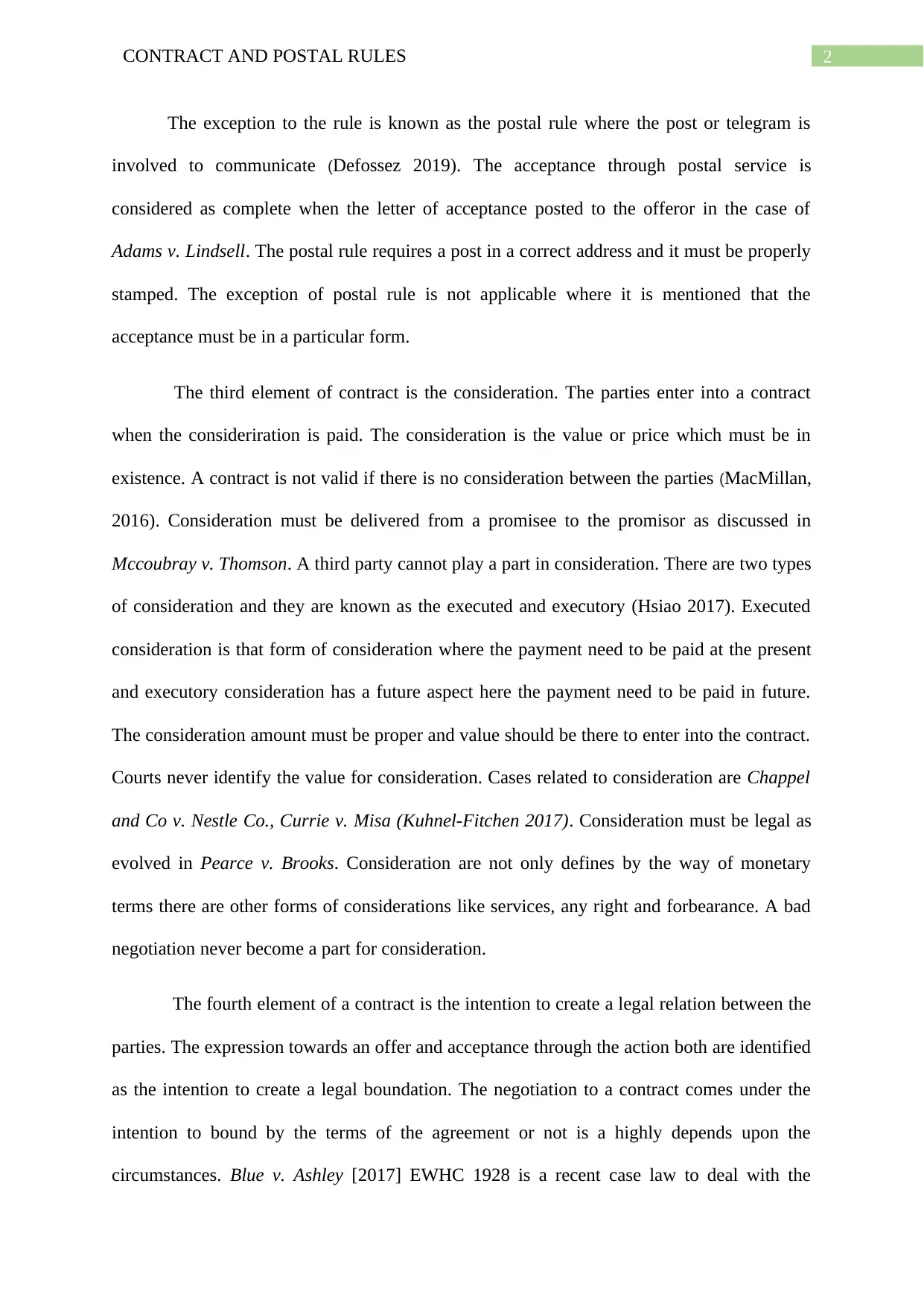
2CONTRACT AND POSTAL RULES
The exception to the rule is known as the postal rule where the post or telegram is
involved to communicate (Defossez 2019). The acceptance through postal service is
considered as complete when the letter of acceptance posted to the offeror in the case of
Adams v. Lindsell. The postal rule requires a post in a correct address and it must be properly
stamped. The exception of postal rule is not applicable where it is mentioned that the
acceptance must be in a particular form.
The third element of contract is the consideration. The parties enter into a contract
when the consideriration is paid. The consideration is the value or price which must be in
existence. A contract is not valid if there is no consideration between the parties (MacMillan,
2016). Consideration must be delivered from a promisee to the promisor as discussed in
Mccoubray v. Thomson. A third party cannot play a part in consideration. There are two types
of consideration and they are known as the executed and executory (Hsiao 2017). Executed
consideration is that form of consideration where the payment need to be paid at the present
and executory consideration has a future aspect here the payment need to be paid in future.
The consideration amount must be proper and value should be there to enter into the contract.
Courts never identify the value for consideration. Cases related to consideration are Chappel
and Co v. Nestle Co., Currie v. Misa (Kuhnel-Fitchen 2017). Consideration must be legal as
evolved in Pearce v. Brooks. Consideration are not only defines by the way of monetary
terms there are other forms of considerations like services, any right and forbearance. A bad
negotiation never become a part for consideration.
The fourth element of a contract is the intention to create a legal relation between the
parties. The expression towards an offer and acceptance through the action both are identified
as the intention to create a legal boundation. The negotiation to a contract comes under the
intention to bound by the terms of the agreement or not is a highly depends upon the
circumstances. Blue v. Ashley [2017] EWHC 1928 is a recent case law to deal with the
The exception to the rule is known as the postal rule where the post or telegram is
involved to communicate (Defossez 2019). The acceptance through postal service is
considered as complete when the letter of acceptance posted to the offeror in the case of
Adams v. Lindsell. The postal rule requires a post in a correct address and it must be properly
stamped. The exception of postal rule is not applicable where it is mentioned that the
acceptance must be in a particular form.
The third element of contract is the consideration. The parties enter into a contract
when the consideriration is paid. The consideration is the value or price which must be in
existence. A contract is not valid if there is no consideration between the parties (MacMillan,
2016). Consideration must be delivered from a promisee to the promisor as discussed in
Mccoubray v. Thomson. A third party cannot play a part in consideration. There are two types
of consideration and they are known as the executed and executory (Hsiao 2017). Executed
consideration is that form of consideration where the payment need to be paid at the present
and executory consideration has a future aspect here the payment need to be paid in future.
The consideration amount must be proper and value should be there to enter into the contract.
Courts never identify the value for consideration. Cases related to consideration are Chappel
and Co v. Nestle Co., Currie v. Misa (Kuhnel-Fitchen 2017). Consideration must be legal as
evolved in Pearce v. Brooks. Consideration are not only defines by the way of monetary
terms there are other forms of considerations like services, any right and forbearance. A bad
negotiation never become a part for consideration.
The fourth element of a contract is the intention to create a legal relation between the
parties. The expression towards an offer and acceptance through the action both are identified
as the intention to create a legal boundation. The negotiation to a contract comes under the
intention to bound by the terms of the agreement or not is a highly depends upon the
circumstances. Blue v. Ashley [2017] EWHC 1928 is a recent case law to deal with the
⊘ This is a preview!⊘
Do you want full access?
Subscribe today to unlock all pages.

Trusted by 1+ million students worldwide
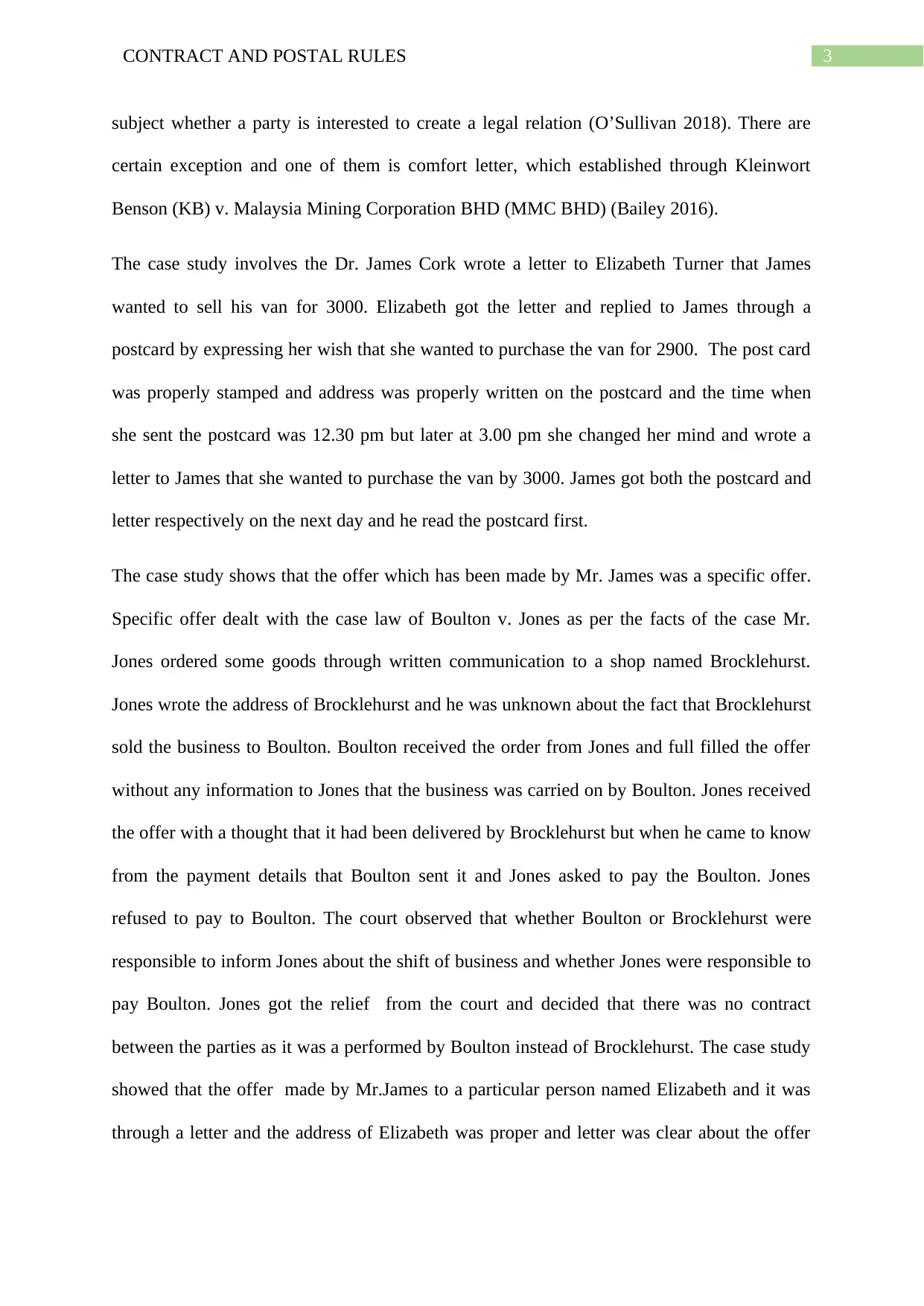
3CONTRACT AND POSTAL RULES
subject whether a party is interested to create a legal relation (O’Sullivan 2018). There are
certain exception and one of them is comfort letter, which established through Kleinwort
Benson (KB) v. Malaysia Mining Corporation BHD (MMC BHD) (Bailey 2016).
The case study involves the Dr. James Cork wrote a letter to Elizabeth Turner that James
wanted to sell his van for 3000. Elizabeth got the letter and replied to James through a
postcard by expressing her wish that she wanted to purchase the van for 2900. The post card
was properly stamped and address was properly written on the postcard and the time when
she sent the postcard was 12.30 pm but later at 3.00 pm she changed her mind and wrote a
letter to James that she wanted to purchase the van by 3000. James got both the postcard and
letter respectively on the next day and he read the postcard first.
The case study shows that the offer which has been made by Mr. James was a specific offer.
Specific offer dealt with the case law of Boulton v. Jones as per the facts of the case Mr.
Jones ordered some goods through written communication to a shop named Brocklehurst.
Jones wrote the address of Brocklehurst and he was unknown about the fact that Brocklehurst
sold the business to Boulton. Boulton received the order from Jones and full filled the offer
without any information to Jones that the business was carried on by Boulton. Jones received
the offer with a thought that it had been delivered by Brocklehurst but when he came to know
from the payment details that Boulton sent it and Jones asked to pay the Boulton. Jones
refused to pay to Boulton. The court observed that whether Boulton or Brocklehurst were
responsible to inform Jones about the shift of business and whether Jones were responsible to
pay Boulton. Jones got the relief from the court and decided that there was no contract
between the parties as it was a performed by Boulton instead of Brocklehurst. The case study
showed that the offer made by Mr.James to a particular person named Elizabeth and it was
through a letter and the address of Elizabeth was proper and letter was clear about the offer
subject whether a party is interested to create a legal relation (O’Sullivan 2018). There are
certain exception and one of them is comfort letter, which established through Kleinwort
Benson (KB) v. Malaysia Mining Corporation BHD (MMC BHD) (Bailey 2016).
The case study involves the Dr. James Cork wrote a letter to Elizabeth Turner that James
wanted to sell his van for 3000. Elizabeth got the letter and replied to James through a
postcard by expressing her wish that she wanted to purchase the van for 2900. The post card
was properly stamped and address was properly written on the postcard and the time when
she sent the postcard was 12.30 pm but later at 3.00 pm she changed her mind and wrote a
letter to James that she wanted to purchase the van by 3000. James got both the postcard and
letter respectively on the next day and he read the postcard first.
The case study shows that the offer which has been made by Mr. James was a specific offer.
Specific offer dealt with the case law of Boulton v. Jones as per the facts of the case Mr.
Jones ordered some goods through written communication to a shop named Brocklehurst.
Jones wrote the address of Brocklehurst and he was unknown about the fact that Brocklehurst
sold the business to Boulton. Boulton received the order from Jones and full filled the offer
without any information to Jones that the business was carried on by Boulton. Jones received
the offer with a thought that it had been delivered by Brocklehurst but when he came to know
from the payment details that Boulton sent it and Jones asked to pay the Boulton. Jones
refused to pay to Boulton. The court observed that whether Boulton or Brocklehurst were
responsible to inform Jones about the shift of business and whether Jones were responsible to
pay Boulton. Jones got the relief from the court and decided that there was no contract
between the parties as it was a performed by Boulton instead of Brocklehurst. The case study
showed that the offer made by Mr.James to a particular person named Elizabeth and it was
through a letter and the address of Elizabeth was proper and letter was clear about the offer
Paraphrase This Document
Need a fresh take? Get an instant paraphrase of this document with our AI Paraphraser
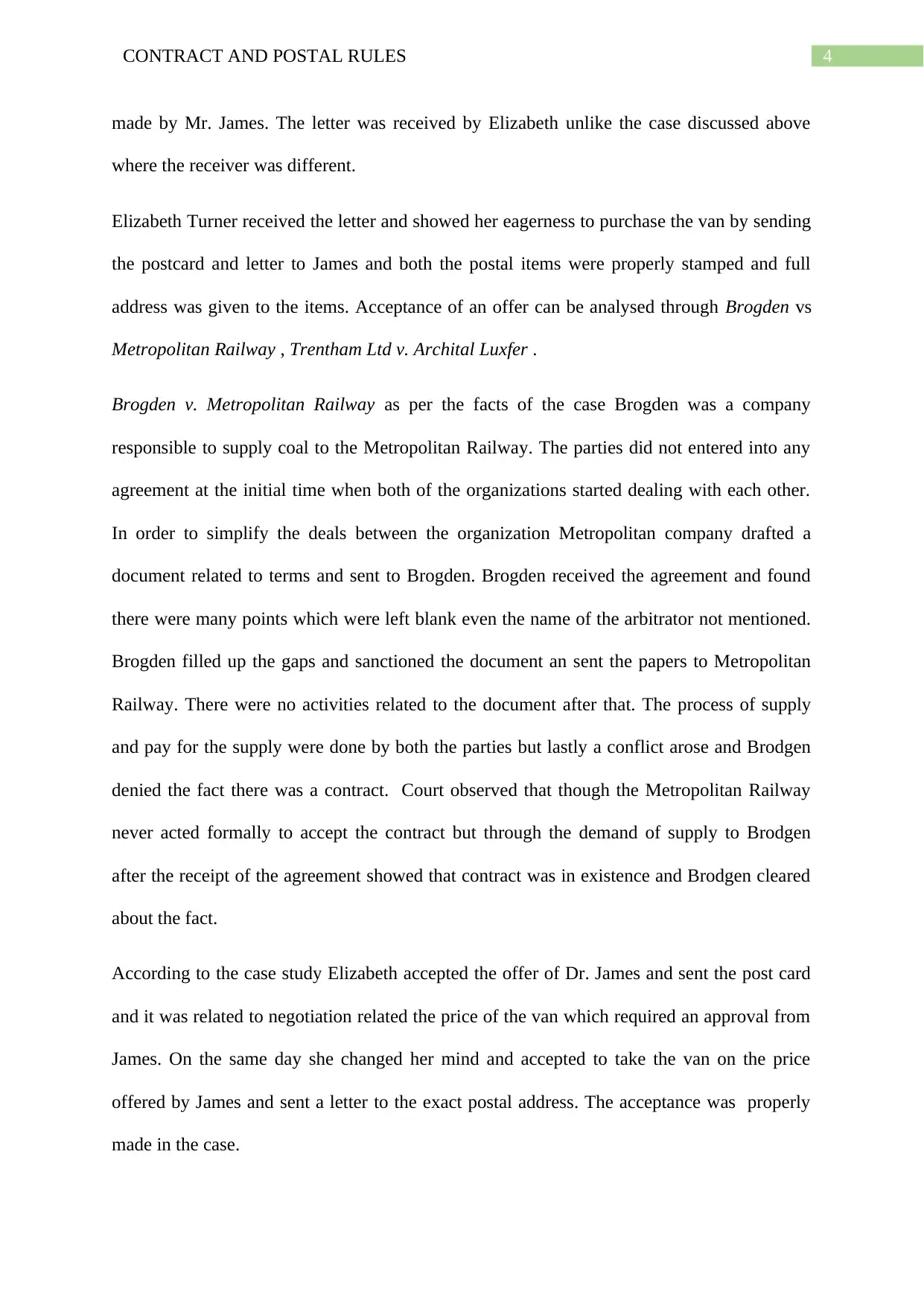
4CONTRACT AND POSTAL RULES
made by Mr. James. The letter was received by Elizabeth unlike the case discussed above
where the receiver was different.
Elizabeth Turner received the letter and showed her eagerness to purchase the van by sending
the postcard and letter to James and both the postal items were properly stamped and full
address was given to the items. Acceptance of an offer can be analysed through Brogden vs
Metropolitan Railway , Trentham Ltd v. Archital Luxfer .
Brogden v. Metropolitan Railway as per the facts of the case Brogden was a company
responsible to supply coal to the Metropolitan Railway. The parties did not entered into any
agreement at the initial time when both of the organizations started dealing with each other.
In order to simplify the deals between the organization Metropolitan company drafted a
document related to terms and sent to Brogden. Brogden received the agreement and found
there were many points which were left blank even the name of the arbitrator not mentioned.
Brogden filled up the gaps and sanctioned the document an sent the papers to Metropolitan
Railway. There were no activities related to the document after that. The process of supply
and pay for the supply were done by both the parties but lastly a conflict arose and Brodgen
denied the fact there was a contract. Court observed that though the Metropolitan Railway
never acted formally to accept the contract but through the demand of supply to Brodgen
after the receipt of the agreement showed that contract was in existence and Brodgen cleared
about the fact.
According to the case study Elizabeth accepted the offer of Dr. James and sent the post card
and it was related to negotiation related the price of the van which required an approval from
James. On the same day she changed her mind and accepted to take the van on the price
offered by James and sent a letter to the exact postal address. The acceptance was properly
made in the case.
made by Mr. James. The letter was received by Elizabeth unlike the case discussed above
where the receiver was different.
Elizabeth Turner received the letter and showed her eagerness to purchase the van by sending
the postcard and letter to James and both the postal items were properly stamped and full
address was given to the items. Acceptance of an offer can be analysed through Brogden vs
Metropolitan Railway , Trentham Ltd v. Archital Luxfer .
Brogden v. Metropolitan Railway as per the facts of the case Brogden was a company
responsible to supply coal to the Metropolitan Railway. The parties did not entered into any
agreement at the initial time when both of the organizations started dealing with each other.
In order to simplify the deals between the organization Metropolitan company drafted a
document related to terms and sent to Brogden. Brogden received the agreement and found
there were many points which were left blank even the name of the arbitrator not mentioned.
Brogden filled up the gaps and sanctioned the document an sent the papers to Metropolitan
Railway. There were no activities related to the document after that. The process of supply
and pay for the supply were done by both the parties but lastly a conflict arose and Brodgen
denied the fact there was a contract. Court observed that though the Metropolitan Railway
never acted formally to accept the contract but through the demand of supply to Brodgen
after the receipt of the agreement showed that contract was in existence and Brodgen cleared
about the fact.
According to the case study Elizabeth accepted the offer of Dr. James and sent the post card
and it was related to negotiation related the price of the van which required an approval from
James. On the same day she changed her mind and accepted to take the van on the price
offered by James and sent a letter to the exact postal address. The acceptance was properly
made in the case.
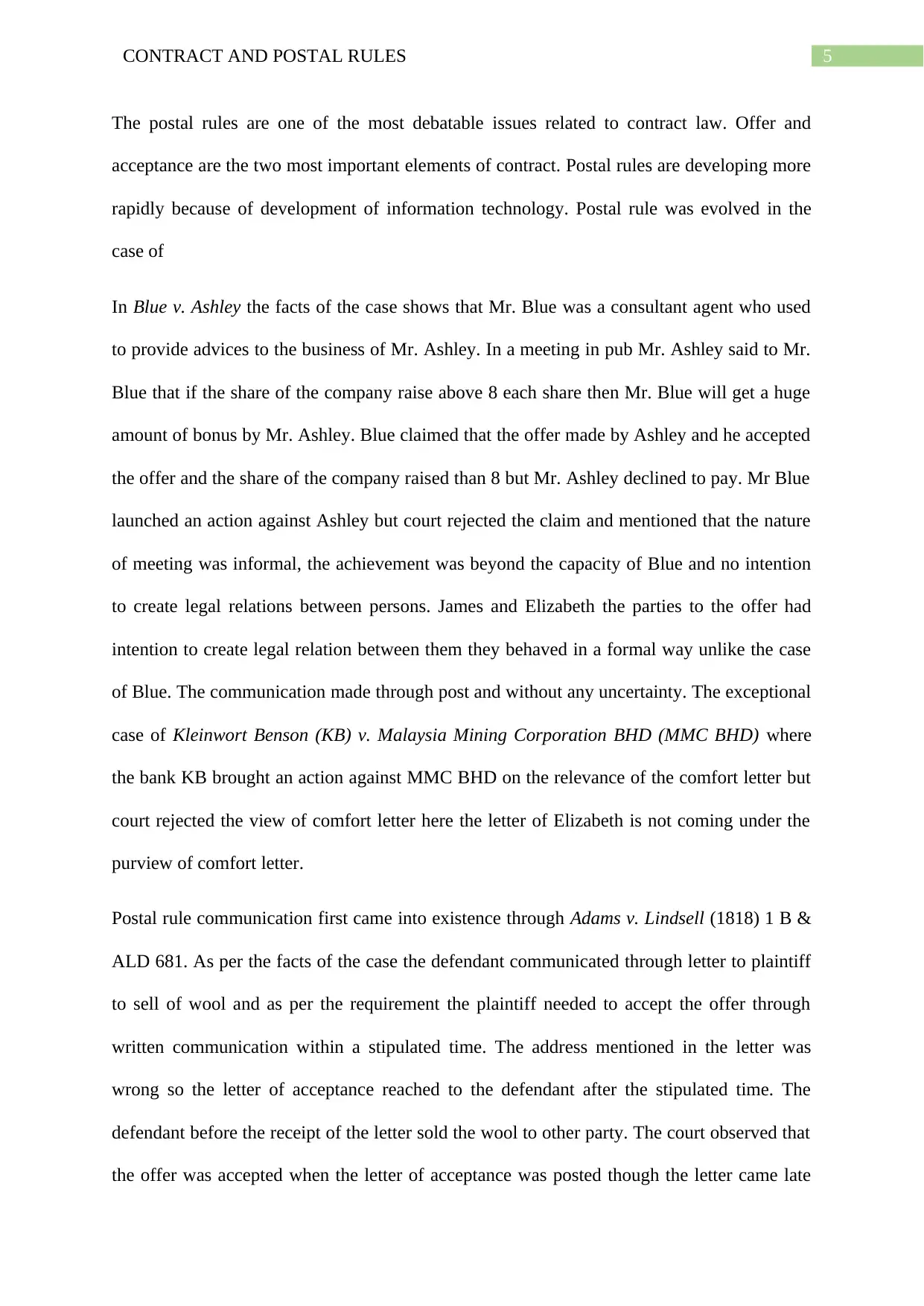
5CONTRACT AND POSTAL RULES
The postal rules are one of the most debatable issues related to contract law. Offer and
acceptance are the two most important elements of contract. Postal rules are developing more
rapidly because of development of information technology. Postal rule was evolved in the
case of
In Blue v. Ashley the facts of the case shows that Mr. Blue was a consultant agent who used
to provide advices to the business of Mr. Ashley. In a meeting in pub Mr. Ashley said to Mr.
Blue that if the share of the company raise above 8 each share then Mr. Blue will get a huge
amount of bonus by Mr. Ashley. Blue claimed that the offer made by Ashley and he accepted
the offer and the share of the company raised than 8 but Mr. Ashley declined to pay. Mr Blue
launched an action against Ashley but court rejected the claim and mentioned that the nature
of meeting was informal, the achievement was beyond the capacity of Blue and no intention
to create legal relations between persons. James and Elizabeth the parties to the offer had
intention to create legal relation between them they behaved in a formal way unlike the case
of Blue. The communication made through post and without any uncertainty. The exceptional
case of Kleinwort Benson (KB) v. Malaysia Mining Corporation BHD (MMC BHD) where
the bank KB brought an action against MMC BHD on the relevance of the comfort letter but
court rejected the view of comfort letter here the letter of Elizabeth is not coming under the
purview of comfort letter.
Postal rule communication first came into existence through Adams v. Lindsell (1818) 1 B &
ALD 681. As per the facts of the case the defendant communicated through letter to plaintiff
to sell of wool and as per the requirement the plaintiff needed to accept the offer through
written communication within a stipulated time. The address mentioned in the letter was
wrong so the letter of acceptance reached to the defendant after the stipulated time. The
defendant before the receipt of the letter sold the wool to other party. The court observed that
the offer was accepted when the letter of acceptance was posted though the letter came late
The postal rules are one of the most debatable issues related to contract law. Offer and
acceptance are the two most important elements of contract. Postal rules are developing more
rapidly because of development of information technology. Postal rule was evolved in the
case of
In Blue v. Ashley the facts of the case shows that Mr. Blue was a consultant agent who used
to provide advices to the business of Mr. Ashley. In a meeting in pub Mr. Ashley said to Mr.
Blue that if the share of the company raise above 8 each share then Mr. Blue will get a huge
amount of bonus by Mr. Ashley. Blue claimed that the offer made by Ashley and he accepted
the offer and the share of the company raised than 8 but Mr. Ashley declined to pay. Mr Blue
launched an action against Ashley but court rejected the claim and mentioned that the nature
of meeting was informal, the achievement was beyond the capacity of Blue and no intention
to create legal relations between persons. James and Elizabeth the parties to the offer had
intention to create legal relation between them they behaved in a formal way unlike the case
of Blue. The communication made through post and without any uncertainty. The exceptional
case of Kleinwort Benson (KB) v. Malaysia Mining Corporation BHD (MMC BHD) where
the bank KB brought an action against MMC BHD on the relevance of the comfort letter but
court rejected the view of comfort letter here the letter of Elizabeth is not coming under the
purview of comfort letter.
Postal rule communication first came into existence through Adams v. Lindsell (1818) 1 B &
ALD 681. As per the facts of the case the defendant communicated through letter to plaintiff
to sell of wool and as per the requirement the plaintiff needed to accept the offer through
written communication within a stipulated time. The address mentioned in the letter was
wrong so the letter of acceptance reached to the defendant after the stipulated time. The
defendant before the receipt of the letter sold the wool to other party. The court observed that
the offer was accepted when the letter of acceptance was posted though the letter came late
⊘ This is a preview!⊘
Do you want full access?
Subscribe today to unlock all pages.

Trusted by 1+ million students worldwide
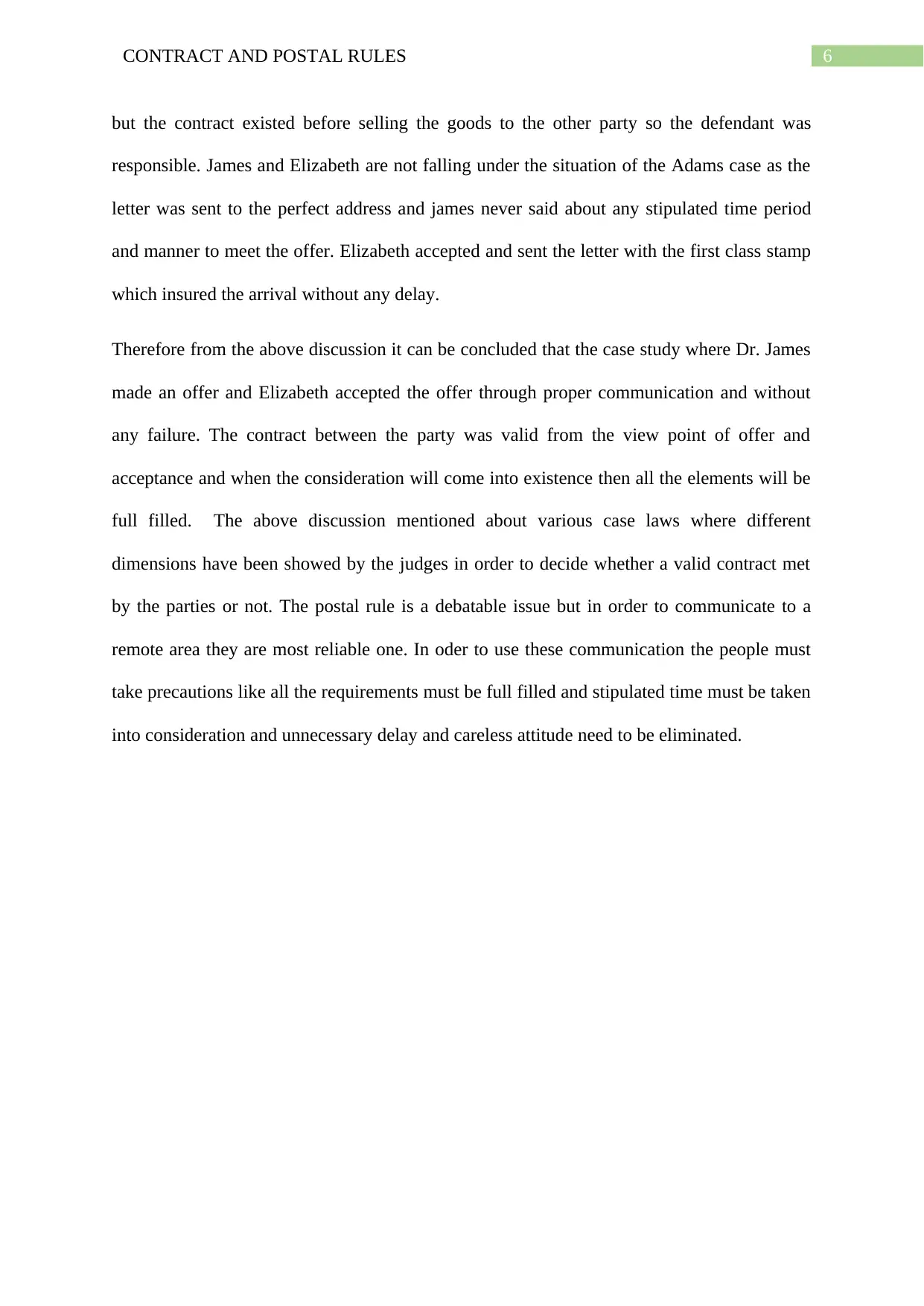
6CONTRACT AND POSTAL RULES
but the contract existed before selling the goods to the other party so the defendant was
responsible. James and Elizabeth are not falling under the situation of the Adams case as the
letter was sent to the perfect address and james never said about any stipulated time period
and manner to meet the offer. Elizabeth accepted and sent the letter with the first class stamp
which insured the arrival without any delay.
Therefore from the above discussion it can be concluded that the case study where Dr. James
made an offer and Elizabeth accepted the offer through proper communication and without
any failure. The contract between the party was valid from the view point of offer and
acceptance and when the consideration will come into existence then all the elements will be
full filled. The above discussion mentioned about various case laws where different
dimensions have been showed by the judges in order to decide whether a valid contract met
by the parties or not. The postal rule is a debatable issue but in order to communicate to a
remote area they are most reliable one. In oder to use these communication the people must
take precautions like all the requirements must be full filled and stipulated time must be taken
into consideration and unnecessary delay and careless attitude need to be eliminated.
but the contract existed before selling the goods to the other party so the defendant was
responsible. James and Elizabeth are not falling under the situation of the Adams case as the
letter was sent to the perfect address and james never said about any stipulated time period
and manner to meet the offer. Elizabeth accepted and sent the letter with the first class stamp
which insured the arrival without any delay.
Therefore from the above discussion it can be concluded that the case study where Dr. James
made an offer and Elizabeth accepted the offer through proper communication and without
any failure. The contract between the party was valid from the view point of offer and
acceptance and when the consideration will come into existence then all the elements will be
full filled. The above discussion mentioned about various case laws where different
dimensions have been showed by the judges in order to decide whether a valid contract met
by the parties or not. The postal rule is a debatable issue but in order to communicate to a
remote area they are most reliable one. In oder to use these communication the people must
take precautions like all the requirements must be full filled and stipulated time must be taken
into consideration and unnecessary delay and careless attitude need to be eliminated.
Paraphrase This Document
Need a fresh take? Get an instant paraphrase of this document with our AI Paraphraser
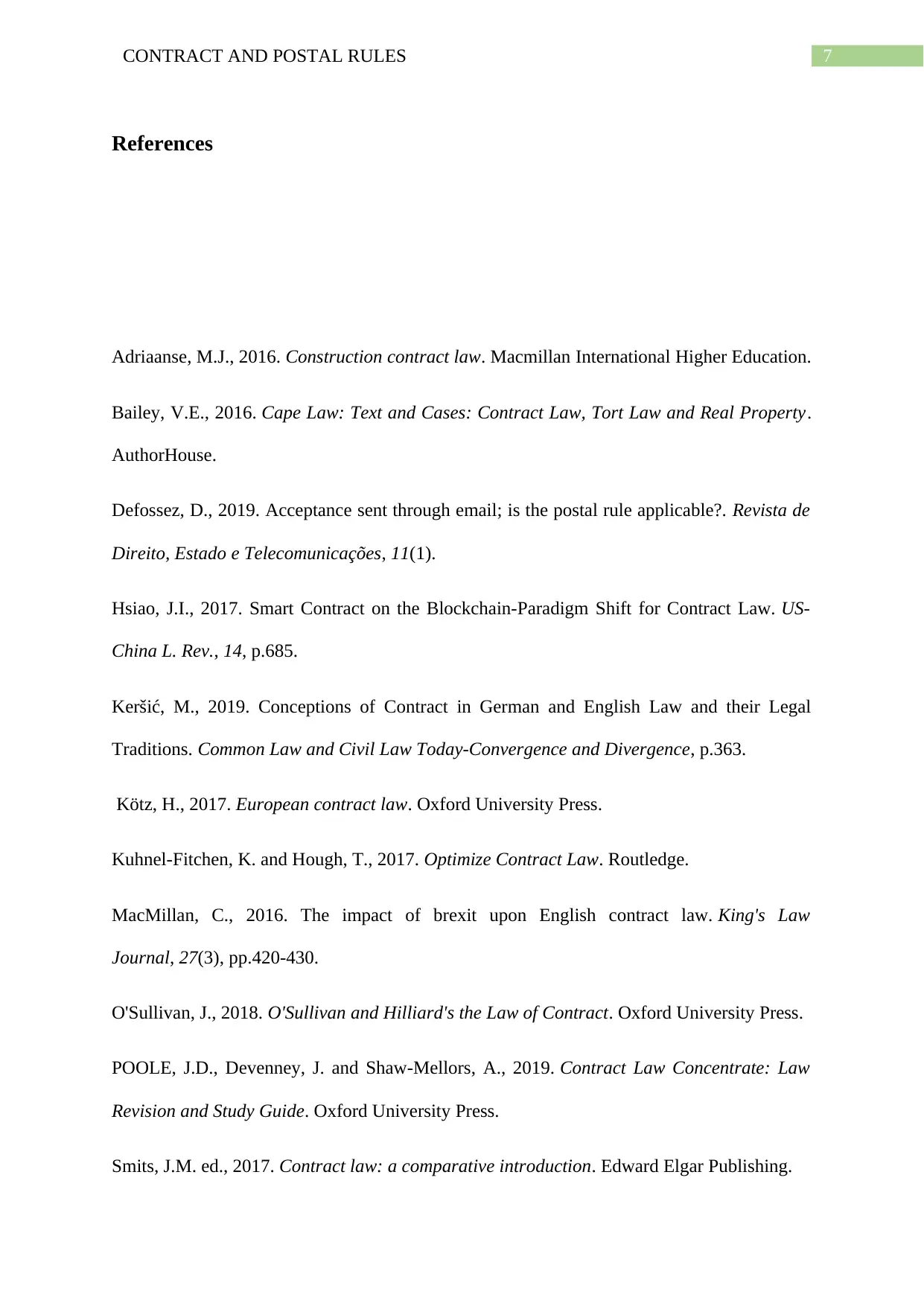
7CONTRACT AND POSTAL RULES
References
Adriaanse, M.J., 2016. Construction contract law. Macmillan International Higher Education.
Bailey, V.E., 2016. Cape Law: Text and Cases: Contract Law, Tort Law and Real Property.
AuthorHouse.
Defossez, D., 2019. Acceptance sent through email; is the postal rule applicable?. Revista de
Direito, Estado e Telecomunicações, 11(1).
Hsiao, J.I., 2017. Smart Contract on the Blockchain-Paradigm Shift for Contract Law. US-
China L. Rev., 14, p.685.
Keršić, M., 2019. Conceptions of Contract in German and English Law and their Legal
Traditions. Common Law and Civil Law Today-Convergence and Divergence, p.363.
Kötz, H., 2017. European contract law. Oxford University Press.
Kuhnel-Fitchen, K. and Hough, T., 2017. Optimize Contract Law. Routledge.
MacMillan, C., 2016. The impact of brexit upon English contract law. King's Law
Journal, 27(3), pp.420-430.
O'Sullivan, J., 2018. O'Sullivan and Hilliard's the Law of Contract. Oxford University Press.
POOLE, J.D., Devenney, J. and Shaw-Mellors, A., 2019. Contract Law Concentrate: Law
Revision and Study Guide. Oxford University Press.
Smits, J.M. ed., 2017. Contract law: a comparative introduction. Edward Elgar Publishing.
References
Adriaanse, M.J., 2016. Construction contract law. Macmillan International Higher Education.
Bailey, V.E., 2016. Cape Law: Text and Cases: Contract Law, Tort Law and Real Property.
AuthorHouse.
Defossez, D., 2019. Acceptance sent through email; is the postal rule applicable?. Revista de
Direito, Estado e Telecomunicações, 11(1).
Hsiao, J.I., 2017. Smart Contract on the Blockchain-Paradigm Shift for Contract Law. US-
China L. Rev., 14, p.685.
Keršić, M., 2019. Conceptions of Contract in German and English Law and their Legal
Traditions. Common Law and Civil Law Today-Convergence and Divergence, p.363.
Kötz, H., 2017. European contract law. Oxford University Press.
Kuhnel-Fitchen, K. and Hough, T., 2017. Optimize Contract Law. Routledge.
MacMillan, C., 2016. The impact of brexit upon English contract law. King's Law
Journal, 27(3), pp.420-430.
O'Sullivan, J., 2018. O'Sullivan and Hilliard's the Law of Contract. Oxford University Press.
POOLE, J.D., Devenney, J. and Shaw-Mellors, A., 2019. Contract Law Concentrate: Law
Revision and Study Guide. Oxford University Press.
Smits, J.M. ed., 2017. Contract law: a comparative introduction. Edward Elgar Publishing.

8CONTRACT AND POSTAL RULES
Taylor, R. and Taylor, D., 2019. Contract Law Directions. Directions.
Taylor, R. and Taylor, D., 2019. Contract Law Directions. Directions.
⊘ This is a preview!⊘
Do you want full access?
Subscribe today to unlock all pages.

Trusted by 1+ million students worldwide
1 out of 9
Related Documents
Your All-in-One AI-Powered Toolkit for Academic Success.
+13062052269
info@desklib.com
Available 24*7 on WhatsApp / Email
![[object Object]](/_next/static/media/star-bottom.7253800d.svg)
Unlock your academic potential
Copyright © 2020–2026 A2Z Services. All Rights Reserved. Developed and managed by ZUCOL.





